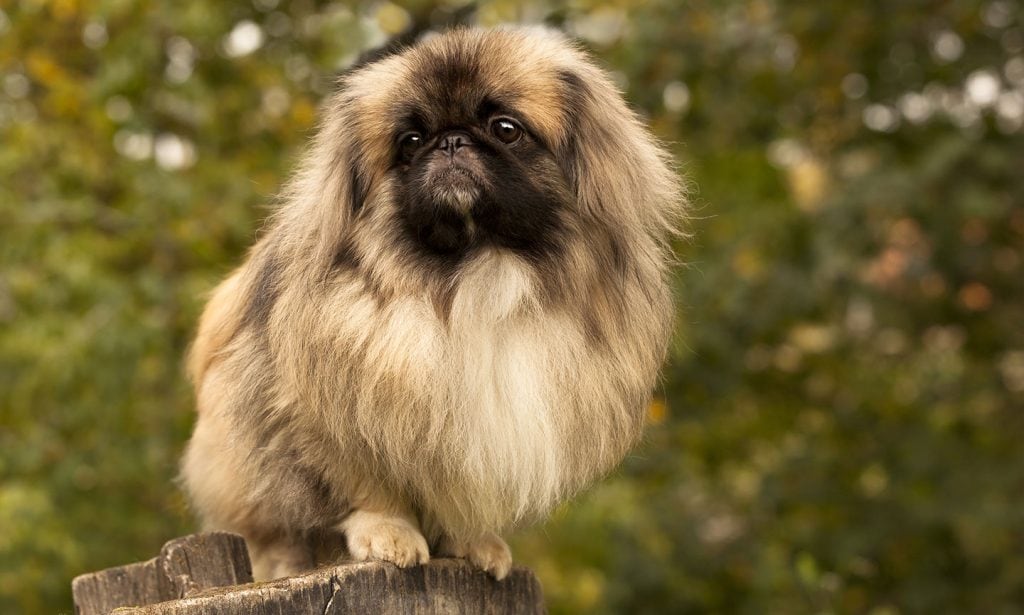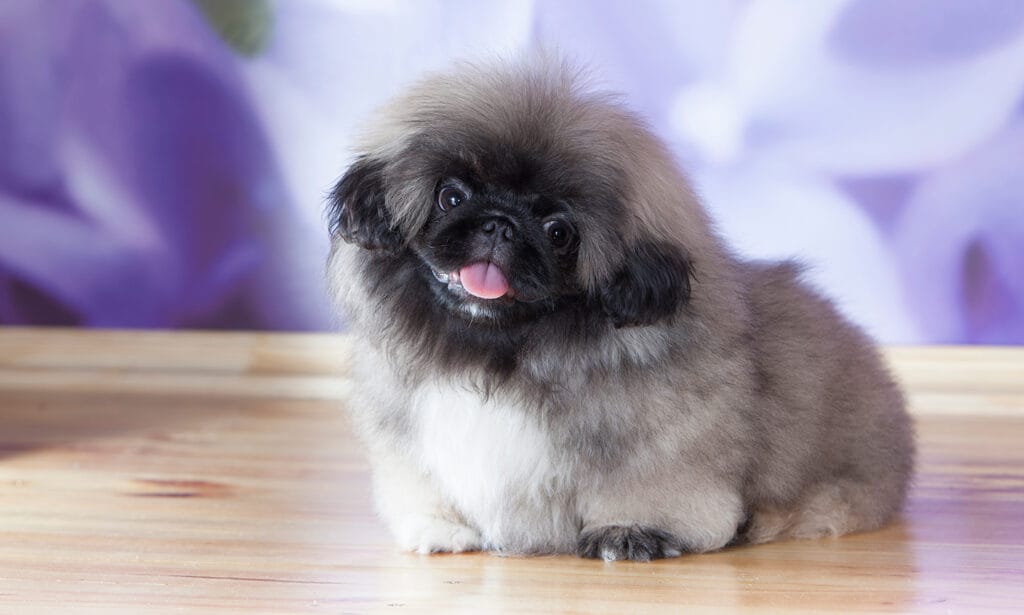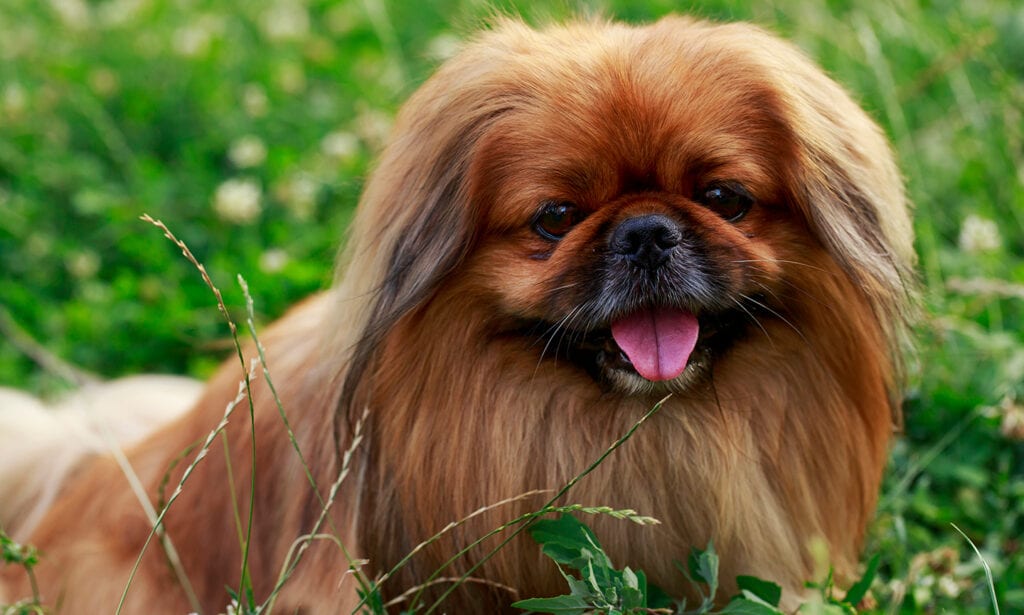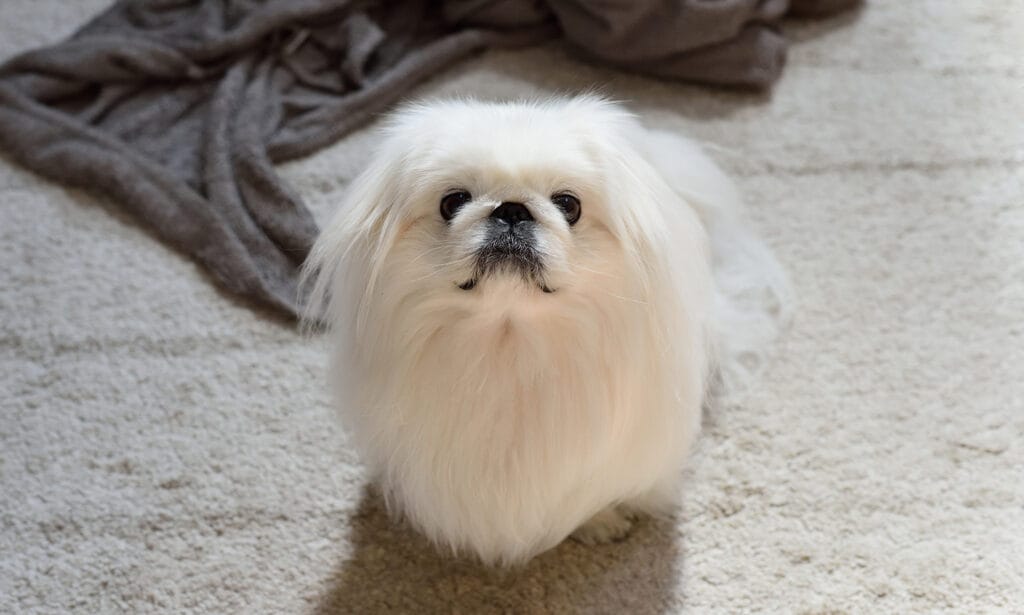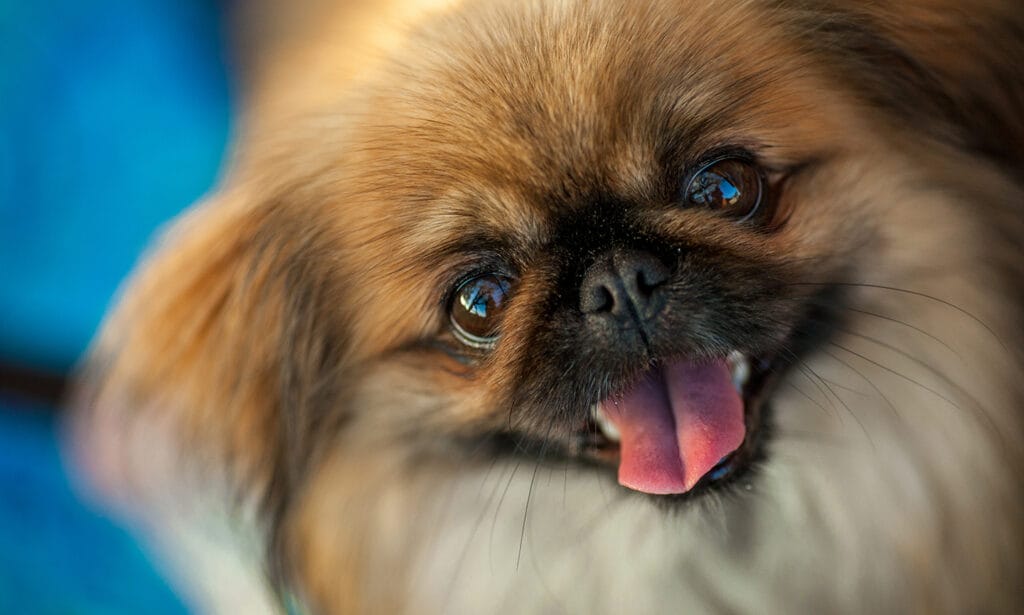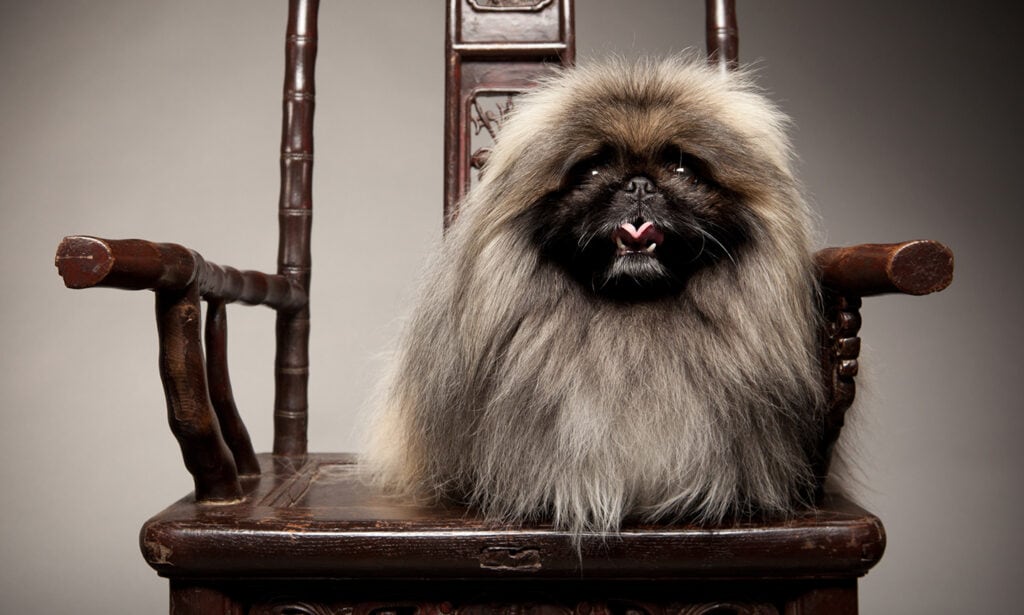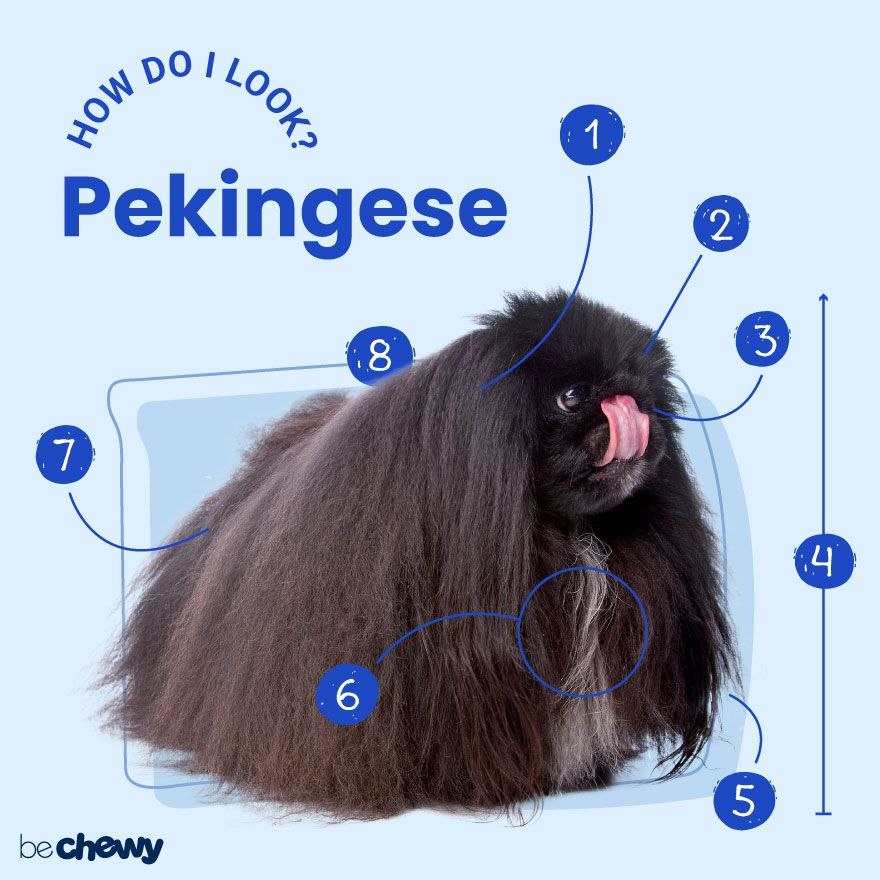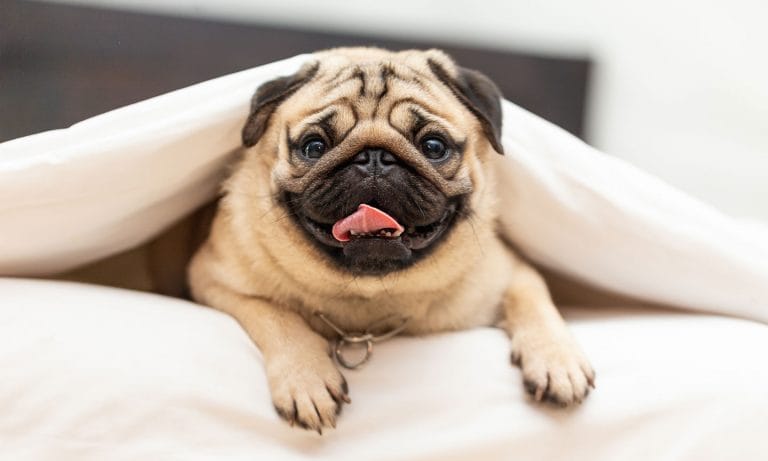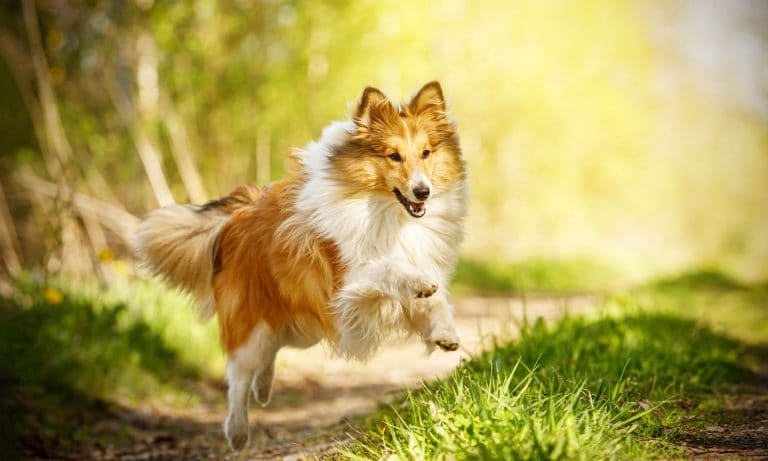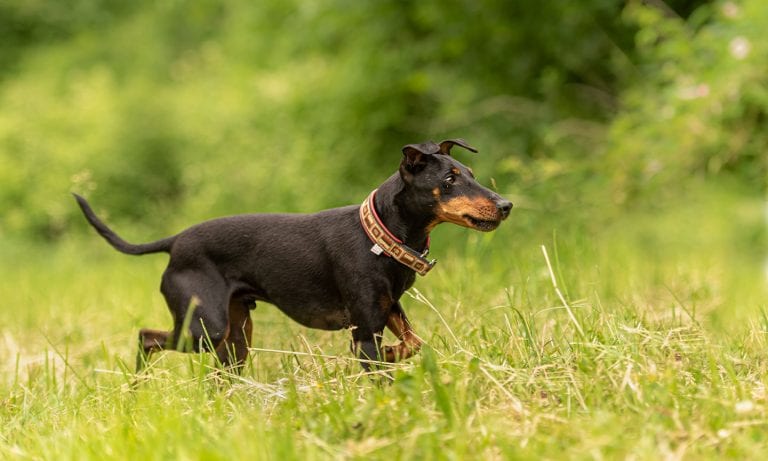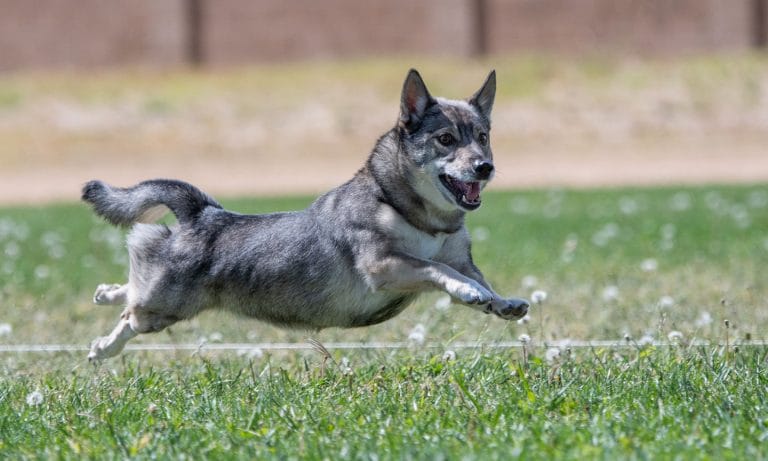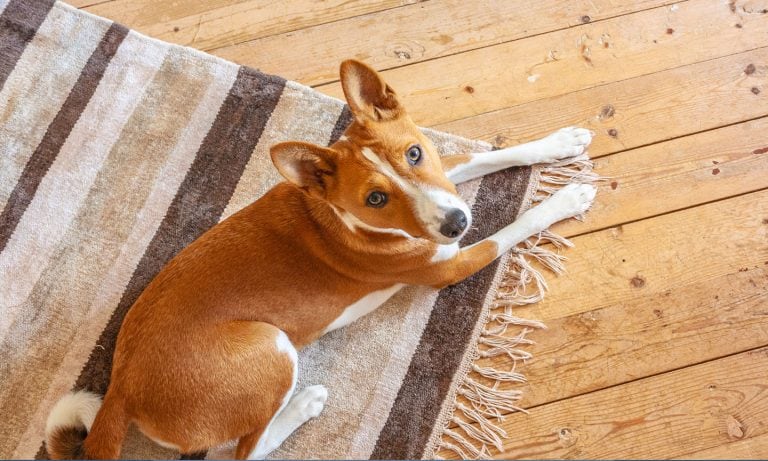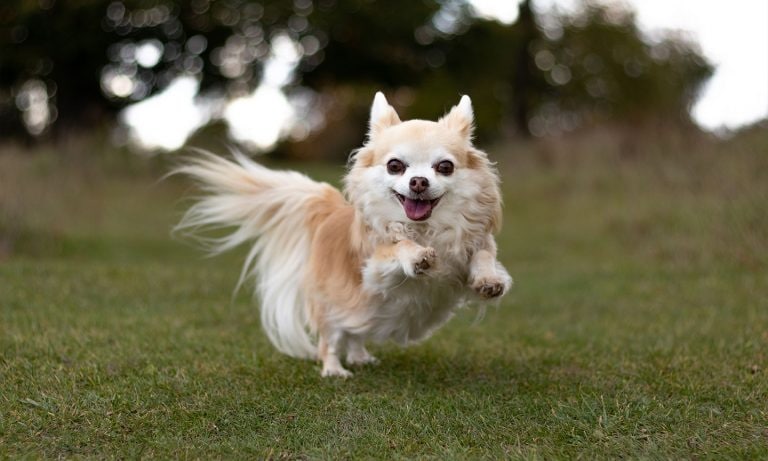The Pekingese is literally doggy royalty—and don’t they know it! Bred to be companions to emperors, these little pups certainly understand the finer things in life. That includes quiet mornings for reflection. And if you wake them up early for a morning jog, they’ll roll their eyes and go back to bed. (Who gets up before the sun, anyway?) These feisty little pups know what they want, and they have no problem telling you, their favorite head of staff. But don’t be fooled, being a pet parent to a Pekingese is plenty of fun—just be prepared to set out a few velvet cushions for your little monarch to lounge on.
Breed Snapshot
Temperament:
Strong-WilledAttention-SeekersPeople-OrientedCoat Color:
BiscuitBlackBlack And TanCreamFawnSableFawn SableGrayGray SableRedRed SableWhite
Best For
Small, smart and charming, Pekingese are best for experienced pet parents who can provide consistent training and socialization. These "lion dogs" prefer a quiet, low-key lifestyle and are a great choice for apartment or urban living.
Pekingese Temperament
Pekingese bond very strongly with their families, but they’re less impressed with strangers. As a natural and observant watchdog, one of their qualities includes keeping a close eye on their surroundings. They will bark to let you know if anyone is approaching their kingdom, which they’ll often take to include the whole neighborhood!
They’re certainly not an aggressive breed, but they’re not afraid to let people and other dogs know if they’ve overstepped the mark. They can live in a house with kids and babies but won’t necessarily want to play with them. It’s not that they don’t like kids; they just don’t know what to do with them. Pekingese are not as playful as some other dog breeds, like the Labrador Retriever, and they’d rather chill with you on the couch. If you do have kids around, make sure they know how to interact with a dog in a gentle and appropriate manner. A Pekingese may nip if their patience is tested too often. They can also live with other pets, although they may not be tolerant of a playful kitten or bouncy puppy as they get older. Because of this, it’s important to start socializing your puppy early, so they get used to being around kids and other animals.
Pekingese are incredibly charming, and they know how to use that to their advantage. They also have a huge amount of boldness and self-esteem—traits that stem from centuries of being revered by royalty. This, combined with their small size, means it can be tempting to slack off on training, but Pekingese need an experienced pet parent who understands the need for consistency so they don’t fall into bad habits, like deciding potty training isn’t important. Just because they can be more challenging to train than other breeds doesn’t mean these dogs aren’t intelligent. On the contrary, they’re smart enough to train their humans—so watch out!
This breed adores spending time with their pet parents but will also happily spend a few hours on their own indoors. They can sometimes bond with one member of the family more than everyone else, and while they will be affectionate with all their family, their true devotion will be reserved for their chosen person.
How to Care for a Pekingese
Pekingese expect to be waited on like the royal dogs they are. They might be small, but they need a decent amount of both grooming and training. They don’t need much exercise, but they do expect (and demand) plenty of affection from their devoted pet parents. These little dogs are brachycephalic (which gives them their cute, smooshy faces) and need be in a cooler environment as they can easily overheat in hot weather.
Pekingese Health
Pekingese have a life expectancy of 12-14 years; although, like any breed, they can suffer from a few different types of health issues. It’s a good idea to familiarize yourself with these, so you know you can provide what your Peke needs to stay healthy for as long as possible.
- Brachycephalic Airway Obstruction Syndrome (BAOS): One of the most common health problems for this breed is BAOS. BAOS affects breeds with short muzzles and can lead to breathing problems, particularly in hot weather. In severe cases, surgery may be needed.
- Eye Problems: Pekingese eyes are prominent, and their shortened muzzle can’t protect them from bumps and corneal ulcers. Pekingese can suffer from distichiasis, where extra eyelashes grow inside the eyelid and can be either plucked or treated with lubricants. Cataracts and glaucoma both cause blindness. Cataracts may be treated with surgery, and glaucoma may be treated with analgesics if caught early enough. Dry eye, another eye problem seen in Pekes, may be treated with medicated eye drops.
- Back Problems: The combination of their short legs and long back can result in issues like intervertebral disc disease (IVDD). Symptoms can range from pain to trouble walking to inability to stand or walk. Possible treatment can include rest, medication or surgery based on severity. If your dog is showing signs of IVDD, please see a veterinarian immediately.
- Heart Issues: Pekingese can suffer from mitral valve disease, which may cause a heart murmur. If your vet detects a heart murmur, they will likely refer you to a veterinary cardiologist for an echocardiogram (ultrasound of the heart) to determine the cause.
- Patellar Luxation: This occurs when the kneecap, or patella, slips from the correct position. It’s a common issue in small dogs and can be inherited. The main symptom is lameness, although sometimes this resolves very quickly when the patella returns to the correct position. Treatments vary depending on the severity and range from weight management to surgery.
Pekingese History
The Pekingese breed is of Chinese origin, with legends telling us that Buddha took a lion and shrunk them into the size of a dog to create the Pekingese breed, aka the “lion dog.” While this might not be the true facts of how the breed came to be, we do know the Imperial Family in 8th-century China was fascinated with the breeding of small dogs. The Pekingese share their heritage with the Shih Tzu and Pug in that respect. These breeds were protected by the Chinese emperors of the Peking Palace for centuries, with the Western world being unaware of their existence.
The Pekingese dog was bred to be companion dogs to Chinese nobles—only they were allowed to have them. But the dogs became ornamental as some nobles would carry their dogs in the wide sleeves of their robes, which led to the Pekingese’s other nickname, “sleeve dogs.” These sleeve dogs also became the personal guard dogs for the nobles who carried them.
The Pekingese only came to the West after Peking (now called Beijing) was ransacked by the British in 1860. History tells us the Chinese nobility killed their dogs rather than allow them to fall into the hands of their enemies. Despite their attempts, five dogs were discovered in hiding and were removed by British troops before the Palace was burnt.
These dogs were brought to Britain and gifted to Queen Victoria, and the Pekingese dog became the favorite of another royal family. The first Pekingese came to the US in the late 1890s, and the breed was registered with the American Kennel Club (AKC) in 1906. Today, these small dogs rank 96 on the AKC’s popularity list.
Ready to look for a Pekingese puppy? The best place to start your search is with the reputable breeders on the AKC website. Pekingese puppies cost $700-$3,000. Reputable breeders should screen for health and temperament issues and may offer pedigree papers. If you’d like to adopt a Pekingese dog, look for a Pekingese rescue or keep an eye out for the breed at a local animal shelter. You can also search Chewy’s database of adoptable dogs in your area.
FAQs
Do Pekingese shed?
Yes, Pekingese shed. And thanks to their long and dense double coat, their shedding can be significant. Pekingese will shed throughout the year but will often shed more heavily in the spring and fall.
How do you pronounce Pekingese?
Pekingese is a word of Chinese origin and is pronounced “pee-kuh-NEEZ,” with emphasis on the last syllable.
Are Pekingese smart dogs?
Yes, Pekingese are smart dogs. They are famous for their intelligence. They’re also known for their independent and spirited natures. So while they may understand exactly what you’re asking them to do, they may simply choose not to do it. The best way to harness the intelligence of your little Peke is to work with a trainer who uses positive reinforcement. (See more of that above in the Training section.)
Do Pekingese bark a lot?
Pekingese only bark when necessary. They are always on the lookout and will sound the alarm whenever they see something out of the ordinary. They’re not overly yappy, so they only bark when there’s something to bark about. Depending on where you live, this may be a little barking or a lot.
Can Pekingese dogs swim?
Technically, Pekingese can swim. However, this breed isn’t a strong swimmer due to their combination of flat face, short legs and dense coat. Some Pekingese may enjoy a paddle in shallow water on a hot day, but they should never be left unattended around water and should always wear a doggy life jacket. If you have swimming pools, ponds or any other types of water on your property, be sure to restrict access, so your dog can’t accidentally fall in.
What are the most common Pekingese mixes?
The most common Pekingese mixes are:
- Pekingese-Chihuahua mix (Pekachi)
- Pekingese-Shih Tzu mix (Shihnese)
- Pekingese-Pug mix (Puginese)
- Pekingese-Pomeranian mix (Peek-A-Pom)
- Pekingese-Yorkshire Terrier mix (Yorkingese)
Note: These are not purebred dogs but mixed breeds.
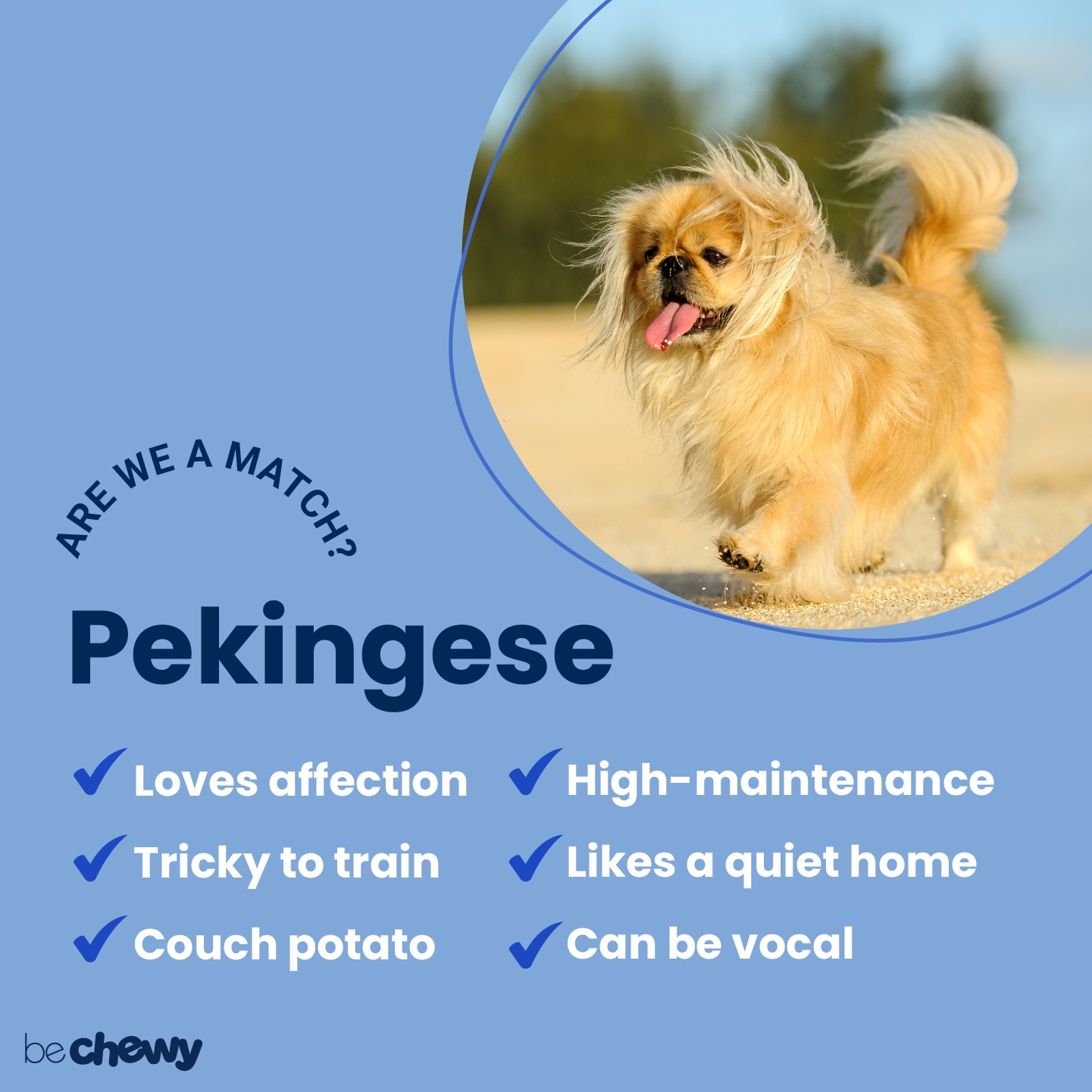
Top Takeaways
The Pekingese is a dog like no other. This ancient Chinese breed bonds strongly with their pet parent, loves to keep watch and would rather be pampered than go to the dog park. They’re bold and confident in their own magnificence, which can make them a little challenging to train. If you’ve got the skills, you’ll never find a more loyal companion than a Peke, and they won’t even mind that you don’t have a throne for them to sit on.
Expert input provided by Dr. Jay Rowan, VMD, co-owner of the AAHA-accredited Paoli Vetcare; and certified dog trainer Jenna Slutzky, KPA, CTP, from Sabra Dog Training.
Breed characteristic ratings provided by veterinarian Dr. Sarah J. Wooten, DVM, CVJ, a veterinarian at Sheep Draw Veterinary Hospital in Greeley, Colorado; dog trainer and behavior consultant Irith Bloom, CPDT-KSA, CBCC-KA, CDBC, owner of The Sophisticated Dog, LLC, in Los Angeles; and certified animal behavior consultant Amy Shojai, CABC, in Sherman, Texas.
The health content was medically reviewed by Chewy vets.

Search for Adoptable Pekingeses Near You
Female Names
- Luna
- Bella
- Daisy
- Lucy
- Ellie
- Zoe
- Winnie
- Josie
- Sophie
- Izzy
Male Names
- Gizmo
- Milo
- Chewy
- Max
- Rocky
- Lucky
- Buddy
- Teddy
- Loki
- Toby
Share:
